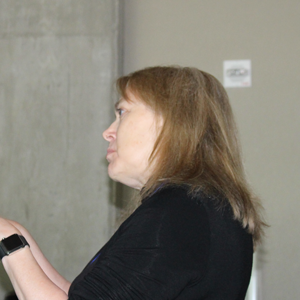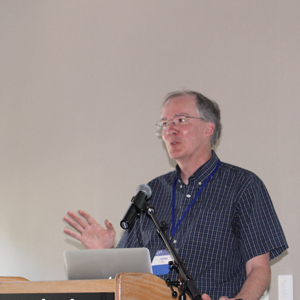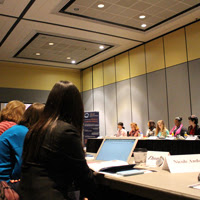Expanding the Pipeline: Diversity Sessions at the CRA Conference at Snowbird with a Focus on Women, Bias, and Harassment

Vicki Hanson, CEO of ACM, shares a comment in the session, “How to Stop Driving Women Out of Computing.
At the recent CRA Conference at Snowbird several sessions focused increasing diversity in computing. The conference provided an excellent opportunity to spread the message of increasing inclusion in computing to a wide audience of department chairs and leaders of government and industrial laboratories.
A plenary panel session on “Diversity in Leadership” moderated by Carla Brodley (Northeastern University) examined the challenges and opportunities in retaining diverse employees. The panelists emphasized that diversity must be a high priority for sustained period to make progress. In a subsequent parallel session, “Increasing Diversity in Computing is Easier Than You Think: Some Small Steps that Make a Big Difference,” led by Mary Hall (University of Utah), a panel shared information on best practices. The panelists emphasized: creating a community and welcoming environment for students from underrepresented groups; ways to recruit and to make a campus welcoming to diverse faculty; encouraging faculty to engage in service activities that support the mission of broadening participation; and recognizing that diversity includes people with disabilities as well.
Focus on Women, Bias, and Harassment
CRA and CRA-W board member Kathryn McKinley chaired the session “How to Stop Driving Women Out of Computing — What happens in your backyard matters!” which explored bias and harassment. It was well attended by both men and women. An interesting theme was that improving undergraduate culture has the potential for high impact on computing research and more broadly.
How We Lost the Women in Computing
Moshe Vardi (Rice University) explored the historical role of women in computing, sharing that in the early days of computing, women were pervasive, and that the social environment of computing has been and still is hostile towards women. Often men are not aware of this hostile environment. “Women did not just leave, they were pushed out.”
Recent Harassment in our Community
Kathryn McKinley reported on the recent National Academies report Sexual Harassment of Women: Climate, Culture, and Consequences in Academic Sciences, Engineering, and Medicine. Findings of the report include:
- Sexual harassment is common in academic science, engineering, and medicine.
- Sexual harassment undermines women’s professional and education attainment, and mental and physical health. The cumulative effect is significant damage to research integrity and a costly loss of talent.
- The legal system alone is inadequate for reducing or preventing harassment.
Recommendations included:
- Go beyond protecting the “University/institutions”
- Address culture and climate.
- Add a code of ethics and research integrity.
- Hold PIs of Federal grants responsible.
- Professional societies have a role.
Bias in Evaluation, Promotion and Recognition
Bobby Schnabel (University of Colorado-Boulder) presented insights from two recent studies. A longitudinal study assessed tenure outcomes of ~1,600 faculty, assistant professors in computer science, English and sociology. Explanations for differences in tenure outcomes between the genders were likely “subtle and/or unconscious gender bias.” The second study, “Raising Doubt in Letters of Recommendation for Academia: Gender Differences and Their Impact,” found more doubt raisers in letters for women faculty applicants.

James Allan (University of Massachusetts-Amherst)
Bias in Honors and Awards
James Allan (University of Massachusetts-Amherst) conducted an informal analysis of the number and percentage of women receiving organizational and society level awards (tables with detailed information are available in the session slides). In summary, while ~20% of PhDs go to women, only around 15% of awards go to them (with wide variations for individual award).
Some Lessons from the Architecture Community
Sarita Adve (UIUC) shared her experience with shining a light on gender issues in the computer architecture community and lessons learned from it:
- Data speaks louder than vague perceptions – the architecture community collected historical data on the representation of women
- The SIGARCH Blog created a digital meeting space for the community
- It takes a village to make change. There are many and diverse supporters taking action now.
- Sometimes it takes a public statement about how the community can improve.
- Sometimes it takes personal stories of bias and harassment to help understand the personal experiences of others.
- Change in large organizations is hard, but small steps matter
- Much work remains but the impact of this conversation is already visible
A list of resources from the session are available here as well as the session slides.









